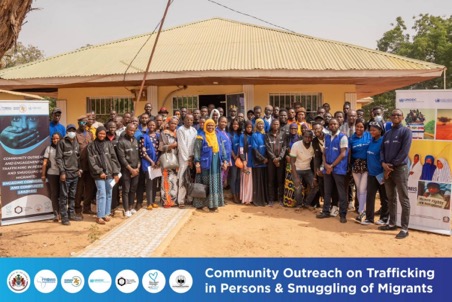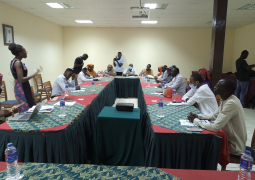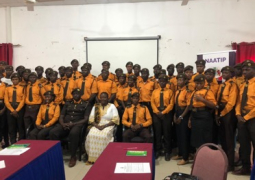
They made the remarks during a community dialogue staged by the United Nations Office Against Drug and Crimes (UNODC) in partnership with The Gambia Cyber Security Alliance (GCSA), National Agency Against Trafficking in Person (NAATIP), Gambia Immigration Department (GID), UTG Law Student Association, among other partners.
Edrissa Waggeh, accountant at the Governor’s Office in Lower River Region (LRR), said paying for the regular route comes with a lot of expenditure, which is why people pay for the irregular route. However, he said, to curb the irregular route, government should decentralize skills centres in the other regions and make them accessible.
Muhammed Ngalan, vice president of UTG Law Student Association, said migrants spend over fifty thousand dalasis to pass through the Mediterranean or Italy to Europe. He observed that this amount could be used to invest in a small business that could yield big profits if determination and seriousness could be put into it.
He therefore urged parents and/or guardians to refrain from pressuring their children into thinking they are useless just because their peers made it in the western world.
Fatou Geo Barry, project coordinator for UNODC Promise Project of The Gambia, called on communities to be conscious of the people that approach them in disguise of wanting to help them.
“Most of these traffickers and smugglers walk into the homes giving offers that are tempting for struggling families, therefore making it hard for families to reject,” she reasons, saying: “We call on communities to be vigilant to ensure we all fight against TIP and SoM.”
Amadou Bah, president of the Gambia Cyber Security Alliance, emphasised that they are committed to fight against TIP and SoM in the cyber world “as recruiters are now using the internet to get to their victims”.
He advised people to positively use the internet by showcasing their talents and skills, which can attract contracts and self development.
Inspector Alkali Jammeh, from Migration Department Unit at Gambia Immigration Department, said the number of migrants that left the shores of The Gambia this year “is high”, adding that they recorded two departures in 2022 and over 20 interceptions in 2023.
“This is an alarming number and most people embarking on the journey are youth,” he stressed. “Majority of them also lose their lives, which handicaps the development of the country because a country without youth is a handicapped one.”
According to him, of late the GID has not been registering departures as “the sea is wild”. However, he said, they are expecting departures in February upwards. He therefore craves the collaboration of every Gambian in the fight against irregular migration to reduce the number of youth dying in the sea.
Read Other Articles In National News

Daylight Africa celebrates 20th anniversary of African Union in Gambia
Sep 21, 2022, 10:38 AM




